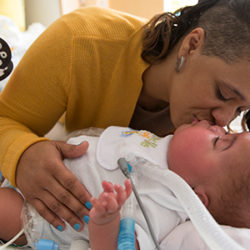
Jayzon .
Bronchopulmonary Dysplaysia (BPD)
When six months pregnant, Bailie woke up the morning of August 17 with mild cramping and called her husband to come home from work. She thought she needed to go to the hospital. She believed she was dehydrated and needed IV fluids. She was right about needing to go to the hospital.
At the hospital, Bailie learned that she was 10 centimeters dilated. “In the midst of panic and the worst fear I’ve ever felt, the doctor asked me which hospital I would want the baby to be transported to . . . ,” says Bailie. “I said I did not care where the baby went, but to choose the best possible care. Nationwide Children’s was the choice for my little 24-week and 6-day-gestation peanut,” she continues.
So about two hours after arriving at the hospital, Bailie gave birth to Banks. Coming into the world four months too soon, and weighing a mere 1 lb. 14 oz., Banks was transported to Nationwide Children’s Hospital.
Each year more than 4,400 babies like Banks receive the highest level of care in Nationwide Children’s Hospital Newborn Intensive and Special Care Units. As one of the largest neonatal centers in the nation, we dedicate ourselves not only to treating, but ultimately preventing all complications of prematurity. What we do is big, but we do it for the smallest of reasons. Reasons like Banks.
Banks was in critical condition for a few weeks but is doing much better now. Some of the care he needed was complex and some was fairly simple. Kangaroo care was one of the latter.
At Nationwide Children’s Hospital, even some of our smallest babies on ventilators and multiple medical devices can be carefully placed against their parents for skin-to-skin contact, or what we refer to as kangaroo care. Research done at Nationwide Children’s has shown that kangaroo care can help stabilize and improve breathing and heart rate, promote weight gain and brain development and can increase deep sleep. And babies who receive kangaroo care oftentimes go home sooner than those who don’t.
The day Banks arrived in this world may have come too quickly, but now Bank’s parents are anxiously waiting for the day he can come home. “He knows our touch. He knows our voice. We can’t wait to bring him home,” says Bailie.
Comments